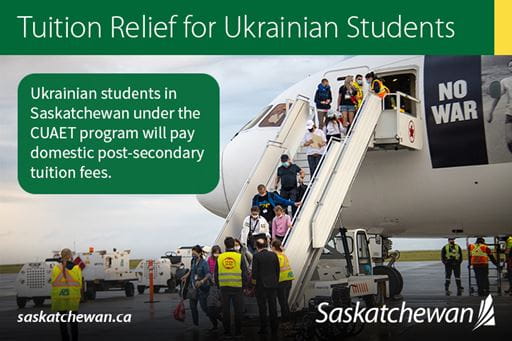Released on May 11, 2023
The Government of Saskatchewan will make it easier for Ukrainian students who arrived in the province over the past year to pursue post-secondary education. The province will provide funding to ensure that those who came to Saskatchewan under the Canada-Ukraine Authorization for Emergency Travel (CUAET) program pay domestic tuition rates rather than international rates.
The CUAET program does not categorize Ukrainian arrivals as refugees. As a result, those who want to pursue post-secondary education would be required to pay higher international student tuition rates.
"Our government remains committed to supporting Ukrainians who have come to Saskatchewan seeking refuge from war," Advanced Education Minister Gordon Wyant said. "These students are in a unique situation. We want them to be able to continue living here to study at one of our excellent post-secondary institutions without causing severe financial hardship for their families."

Among those who may be eligible to pay domestic tuition are approximately two dozen Ukrainian students who will graduate from high school in Saskatchewan this spring. If they choose to pursue post-secondary education in the province, they will now pay the same tuition rates as domestic students.
"This announcement comes at an opportune time for Ukrainian students who are graduating Grade 12 in Saskatchewan this year and considering their futures," Saskatchewan-Ukraine Relations Advisory Committee Chair Gerald Luciuk said. "We continue to be grateful for the support of the Saskatchewan government and the many community organizations and individuals who have welcomed and assisted these new arrivals in so many ways."
"Ukrainian arrivals are contributing in many ways to our communities, our labour force, and the rich cultural fabric of Saskatchewan," Wyant said. "They deserve an opportunity to study in Saskatchewan, and hopefully become permanent residents and contribute to the growth and future of our province."
Information on eligibility requirements is available at saskatchewan.ca/sksupportsukraine.
-30-
For more information, contact:
Carolyn Hamilton
Advanced Education
Regina
Phone: 306-787-6041
Email: carolyn.hamilton2@gov.sk.ca
Cell: 306-537-3593

